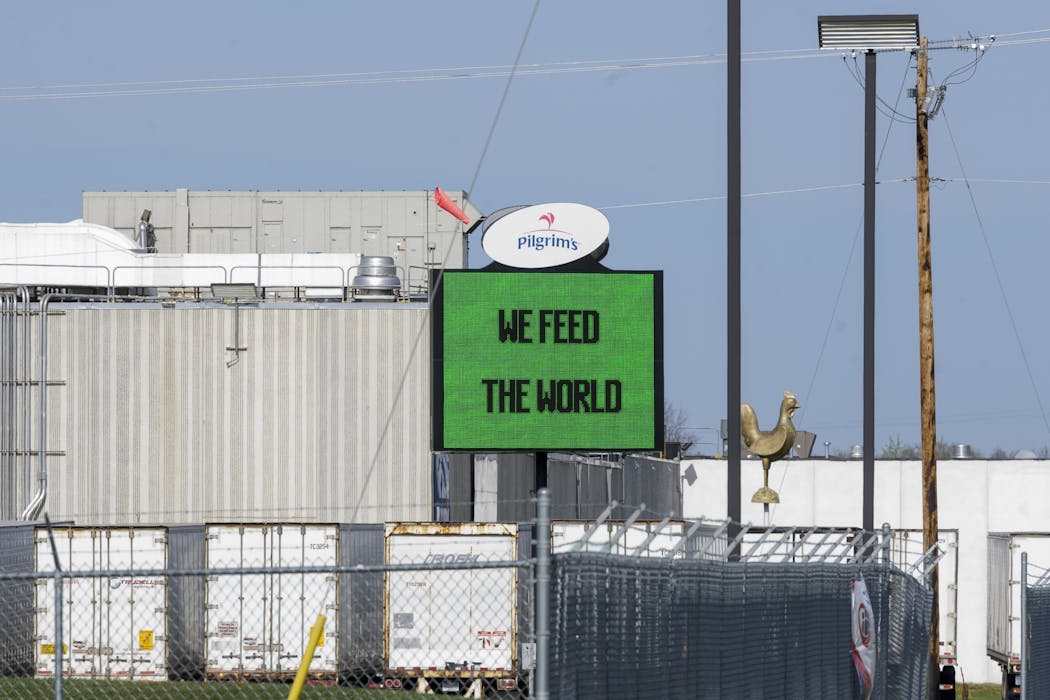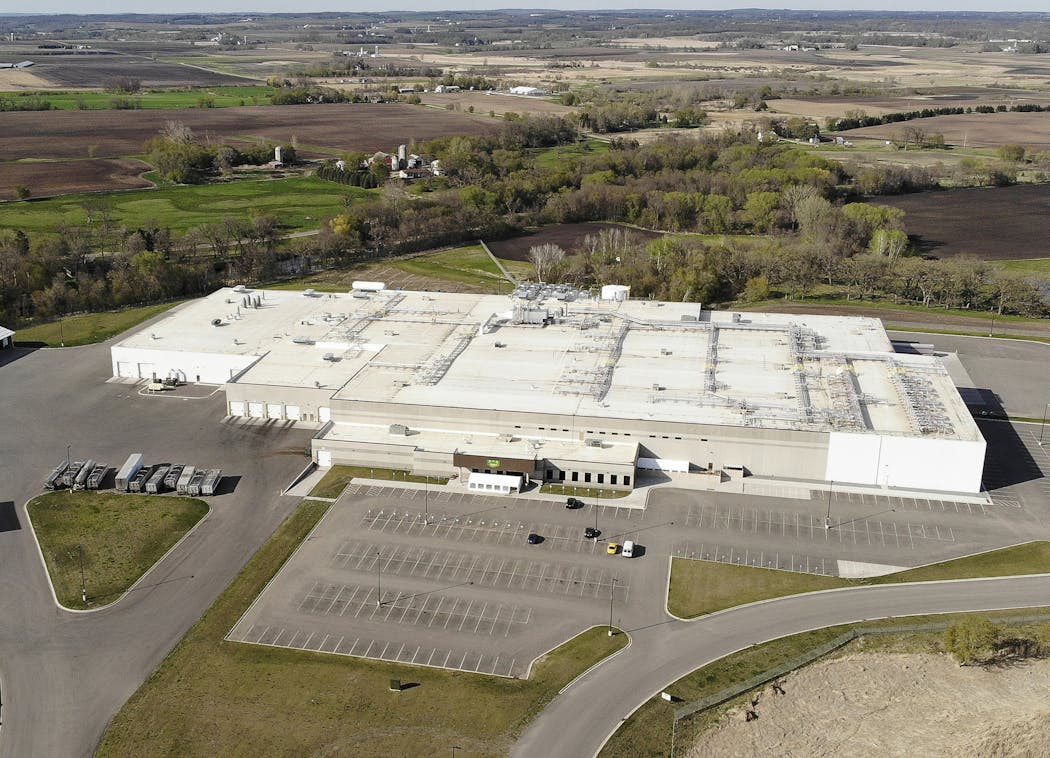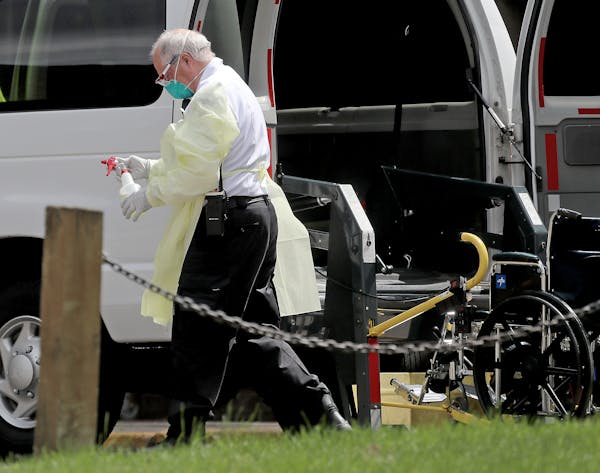A COVID-19 outbreak at poultry processing plants near St. Cloud over the past two weeks has prompted increased testing of workers there and contributed to a spike in the number of cases reported in the central Minnesota region.
The outbreaks — at plants in the Stearns County cities of Cold Spring and Melrose — have quickly established the St. Cloud area as a COVID hot zone, sparking concern among advocates for local immigrants, who make up much of the workforce at the facilities, that not enough is being done to protect them and their families from the dangers of the fast-growing pandemic.
"It feels like Armageddon over there," said Jaylani Hussein, executive director of Council on American-Islamic Relations, who said his organization has interviewed "dozens" of workers who cited unsafe conditions at the Pilgrim's Pride plant in Cold Spring.
The Muslim advocacy group on Thursday called for the Occupational Safety and Health Administration (OSHA) to investigate conditions at the plant.
A spokesman for the Minnesota Department of Labor and Industry, which administers OSHA in Minnesota, confirmed Thursday that Minnesota OSHA opened an investigation at Pilgrim's Pride on April 28 after receiving a complaint. The department generally doesn't disclose who files OSHA complaints.
Jane Conrad, an organizer with Central Minnesota Trades and Labor Assembly, said there have been "two or three" walkouts by workers protesting conditions at Pilgrim's Pride. Organizers have had to reach workers by phone, she said, since the Cold Spring plant is not a union shop.
"The company has taken very few measures to protect workers, beyond taking temperatures about a week ago and handing out thin face masks," Conrad said. "They're still telling people to come in, even after they complain of not feeling well."
Sahur Hussein, a member of a Somali community COVID task force in St. Cloud, said workers who've been tested but don't yet know if they have the virus are being told they need to return to the job.
"People don't feel they have a choice," she said.
Messages seeking comment from Pilgrim's Pride officials were not immediately returned Thursday.
In a statement issued April 27 after workers walked off the job, company officials said they were "working hard to provide a safe working environment for our team members and have implemented several preventive measures," including temperature testing, physical partitions on production lines and requiring personal protective equipment (PPE) to be worn at all times.
Case numbers soar
Officials this week confirmed that increased testing at Pilgrim's Pride and the Jennie-O turkey slaughtering plant in Melrose has contributed to Stearns County becoming one of the region's fastest-growing areas for COVID-19. A New York Times report earlier this week named St. Cloud as the top potential COVID hot spot in the country.
Most of St. Cloud is in Stearns County, but portions also extend into Benton and Sherburne counties, about 65 miles northwest of the Twin Cities.
The Pilgrim's Pride Cold Spring plant employs about 1,100. As of Monday, there were 83 confirmed cases there, state Health Department officials said. The Jennie-O plant in Melrose had 19 cases. That operation, an arm of Austin-based Hormel Foods, employs around 750 people. Workers at Jennie-O's two closed plants in nearby Kandiyohi County also are being tested, officials said.
"In terms of Stearns County, [the rising COVID case count] is definitely being driven by what is happening at the [poultry] processing plants," said Kris Ehresmann, infectious disease director for the Minnesota Department of Health. She added that the department is trying to interview all workers at the poultry plants who tested positive.
As of Thursday, state officials said they had diagnosed 1,161 COVID cases in Stearns County, which ranks behind only Hennepin County for the most confirmed cases. Health Department officials so far have interviewed 185 people and already, nearly half — 87 — were linked to outbreaks at the poultry processing locations.
"We have many, many more people to interview and it is very likely we will see more cases linked to these workplaces," Ehresmann said.
Community advocates on Thursday said many of the workers with COVID are members of St. Cloud's East African communities. And many live in a handful of high-density apartment complexes in the city. Advocates said they worry about the disease spreading rapidly among family members and friends without a more urgent effort by state and local officials to test and contain the coronavirus.
Natalie Ringsmuth, director of Unite Cloud, a group that seeks to ease community tensions over St. Cloud's growing Muslim and immigrant populations, wants to see city leaders speak more forcefully regarding what needs to be done to slow the spread of COVID-19. She said she fears that too many residents outside immigrant communities are minimizing the need for increased screening and testing.
"It's not being treated seriously by everyone," she said of those people who refuse to wear masks or acknowledge the fears of workers at greater risk. "But I don't know if our leaders spoke with more urgency, if that would even help."
St. Cloud Mayor Dave Kleis said officials are concerned about the rise in the number of COVID-19 cases, but he cautioned the public "not to read too much into them."
A spike in cases was expected because of the increase in testing for poultry plant workers. More telling, he said, is that those cases have not yet strained the area's supply of hospital and ICU beds.
"Those are the numbers that we look at," he said.
He also worked to assure the public that the city is working with urgency to address the increase in infections. St. Cloud officials have reassigned nine staff members to help the county with contact tracing, Kleis said, and city workers also are doing outreach in St. Cloud's East African and Latino communities.
"We need to pay attention to those numbers, but bits and pieces are not the whole story," he said.

Minnesota State Patrol celebrates diverse new class of troopers

Fired Mpls. teacher accuses management of 'cancerous rot'

Jill Biden rallies women, teachers for the Biden-Harris ticket in Bloomington speeches
Neighbors, city officials at odds over Rochester lake dam




